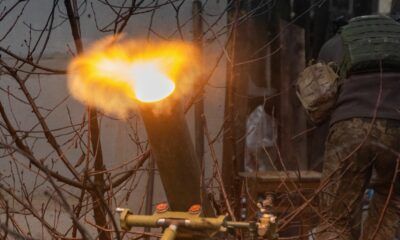INTERNACIONAL
America First foreign policy ‘profoundly dangerous,’ invites multi-front war, eminent historian warns
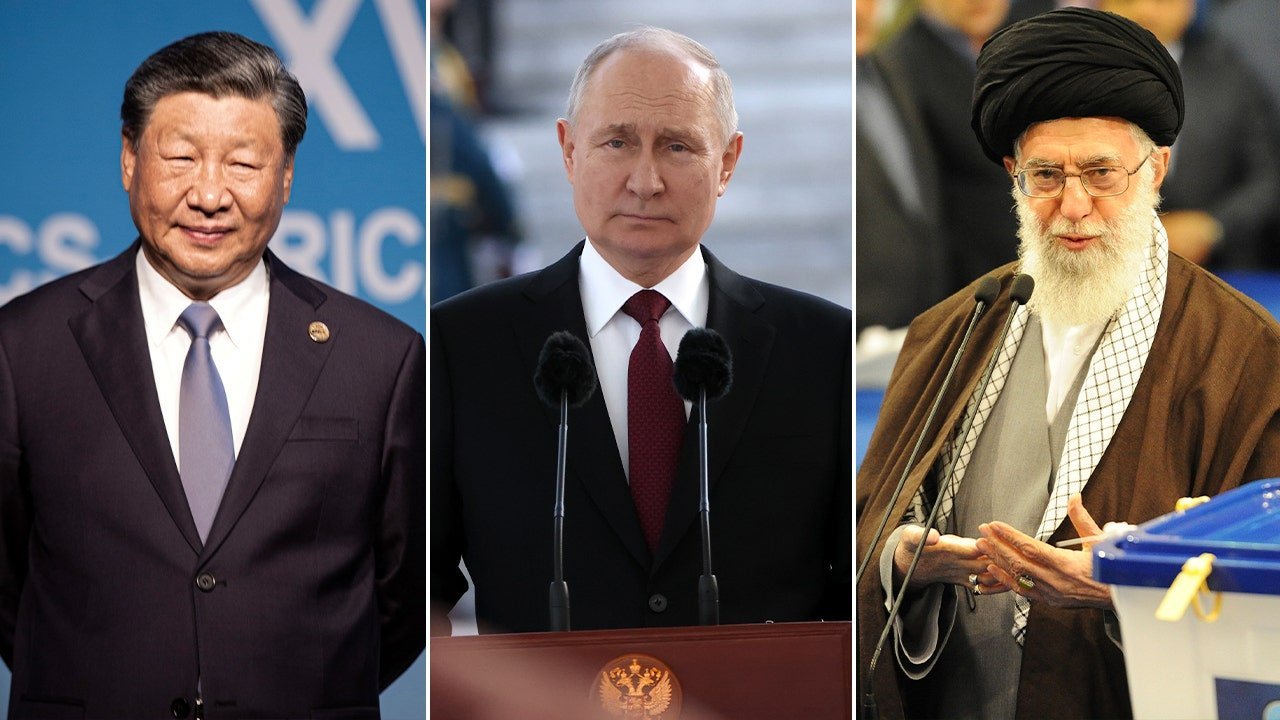
FIRST ON FOX – The United States needs to maintain its global focus and efforts to stymie the growing cooperation and ambition of «axis of evil states,» according to historian and journalist Andrew Roberts, Baron Roberts of Belgravia. Roberts sits in the British House of Lords.
«When it comes to the axis of evil states, frankly, it’s not the worst thing in the world to have a forever war, especially if you will not actually fight,» Roberts, a biographer of several British leaders, including Winston Churchill, told Fox News Digital. «It can be done for an amount which is a really very impressive return on investment.»
Roberts, along with retired Gen. David Petraeus, wrote «Conflict: The Evolution of Warfare from 1945 to Ukraine,» an assessment of U.S. foreign conflict involvement examined through the lens of successful strategic leadership. Roberts is currently working on new chapters for the paperback release, which will focus on the war in Gaza and Chinese President Xi Jinping’s ambitions for Taiwan.
He argued that the United States, as a global superpower, can and should «walk and chew gum» – so to speak – and that American isolationism would prove «a profoundly dangerous force… not just for the rest of the world but for America as well, ultimately.»
HOUSE PASSES $60B UKRAINE AID BILL AS GOP REBELS THREATEN TO OUST JOHNSON
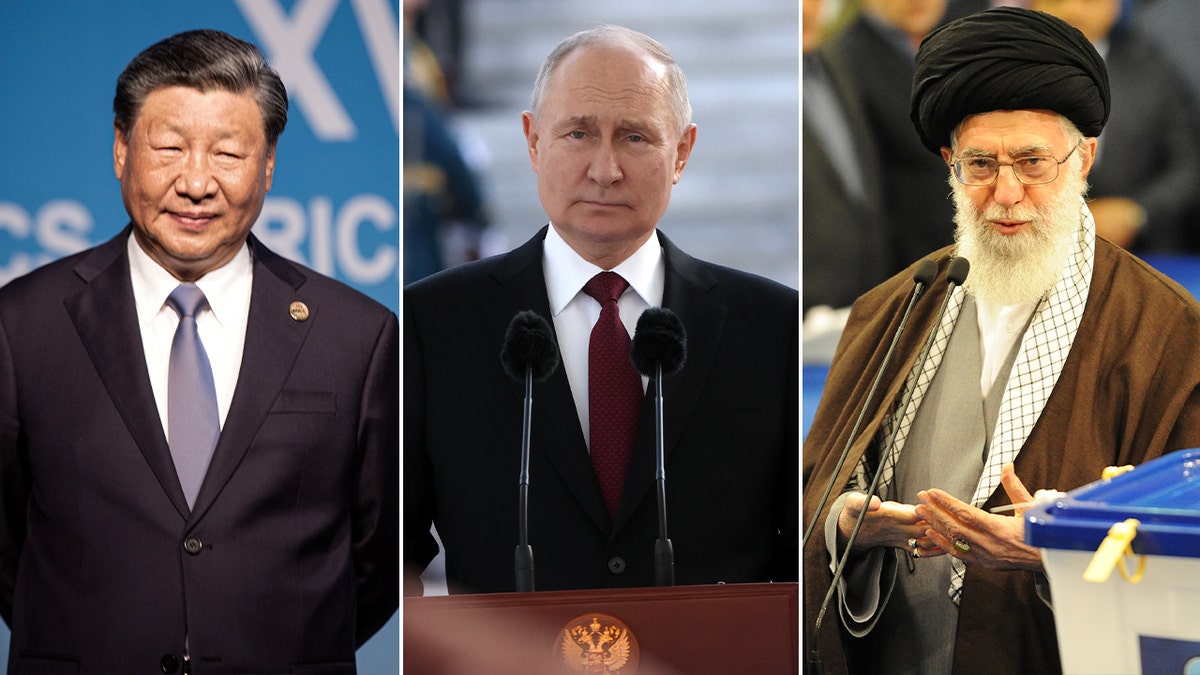
China’s Xi Jinping, Russia’s Vladimir Putin and Iran’s Ali Khamenei (Getty Images)
«If the United States decides to essentially shrug off the responsibility of a great global superpower that you’ve been really since the Great White Fleet circumnavigated the world in 1909, a long time ago now… one can understand that any titan gets weary,» Roberts said. «However, if you were to embrace isolationism, the ultimate response would be from the alliance of anti-democratic nations that we are seeing is working closer and closer… ultimately it will rebound terribly on you.»
The desire for an «America First» policy has grown stronger as the U.S. faces down two significant conflicts – first from Russia, now in its third year of invading Ukraine, and from the bubbling tension between Iran and Israel.
Some Republicans particularly have opposed the continued funding of Ukraine without a clear plan as to how the conflict could end, raising fears of another «forever war» like those the U.S. maintained in the Middle East over the past two decades.
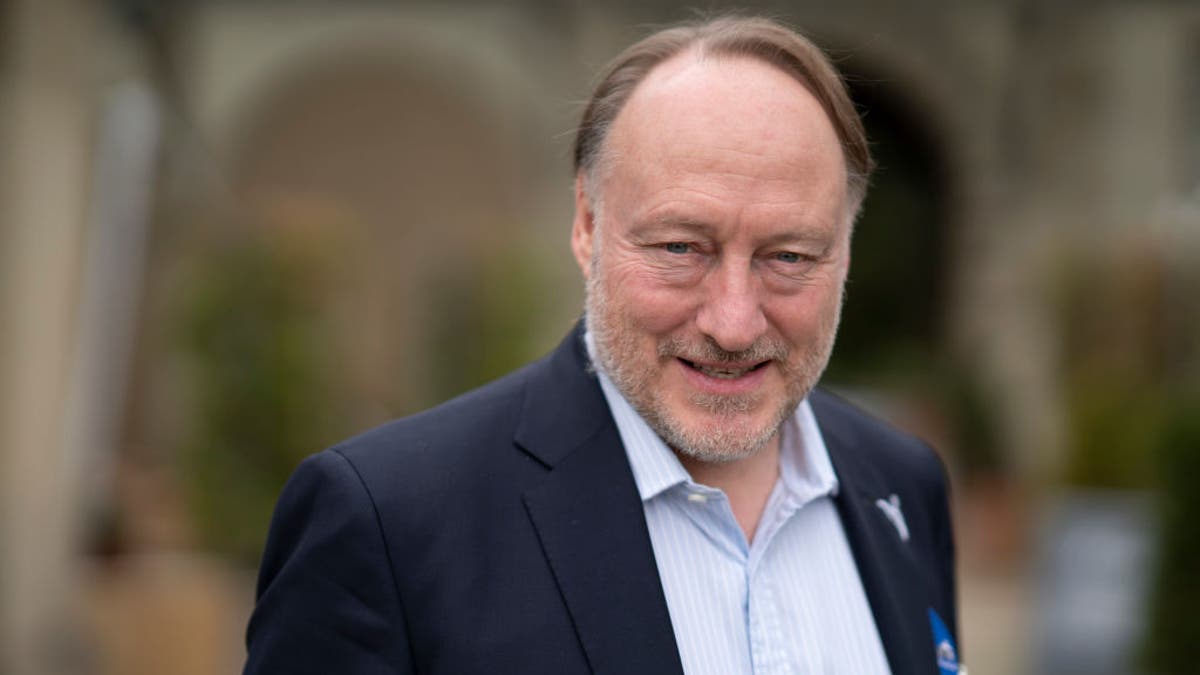
Andrew Roberts, the renowned historian and writer, in Windsor, England, Oct. 23. (David Levenson/Getty Images)
House Republicans have worked to condition aid for Ukraine, which has surpassed $113 billion as of March 2024. Freedom Caucus Chairman Bob Good, R-Va., called for any funding to Ukraine to be balanced out by spending cuts elsewhere and for it to be paired with U.S. border policy changes. The House finally passed the $60 billion funding bill for Ukraine on Saturday.
TRUMP DEMANDS EUROPE COUGH UP MORE CASH FOR UKRAINE, SAYS WAR WITH RUSSIA WOULDN’T HAVE HAPPENED ON HIS WATCH
«We cannot continue to borrow and spend money we don’t have for wars overseas while failing to protect Americans from the Biden border invasion here at home,» Good told Fox News Digital earlier this month. «At a bare minimum, any package for military aid to Ukraine should be fully offset and must include H.R. 2 with performance metrics to secure our own border.»
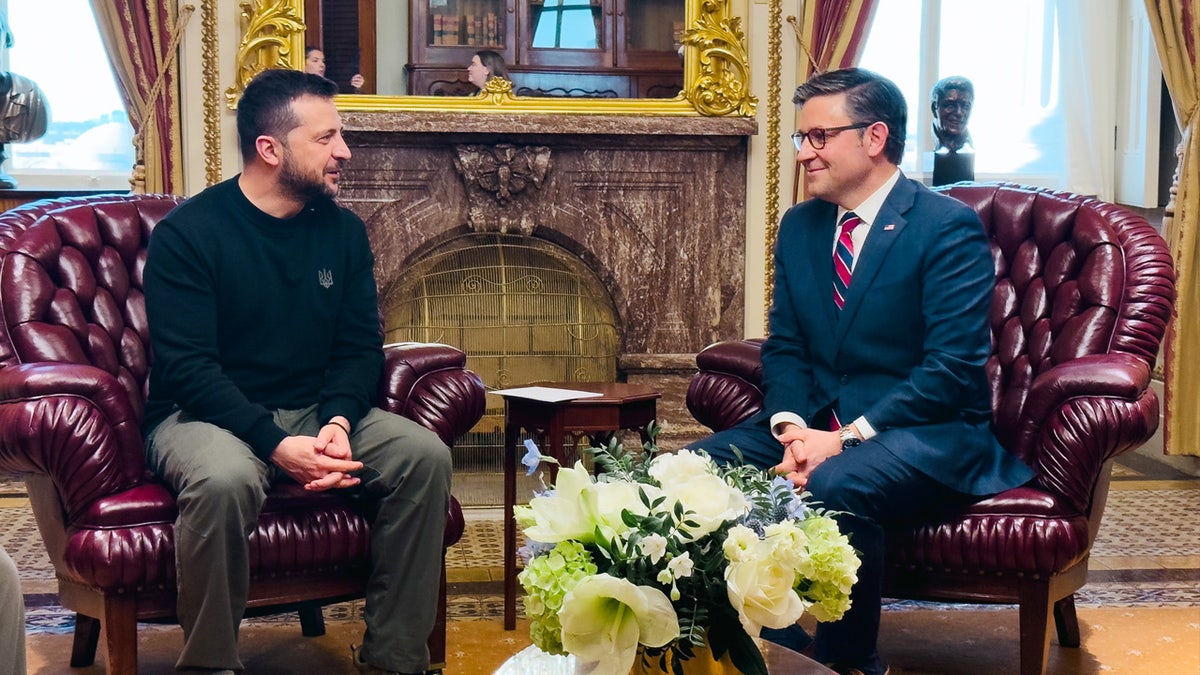
President of Ukraine Volodymyr Zelenskyy meets with House Speaker Mike Johnson to discuss additional aid from Congress. (Courtesy Speaker Mike Johnson’s office)
Roberts argued that the U.S., as a «great superpower… some might argue the only superpower» can protect both itself and support allies in a conflict that has proven an «extremely impressive» return on investment.
«The Ukrainians have taken out well over half of the Russian tank fleet,» Roberts noted. «Now, at any stage in American post-war history, if you offer the president that deal, he’d have snapped it up.»
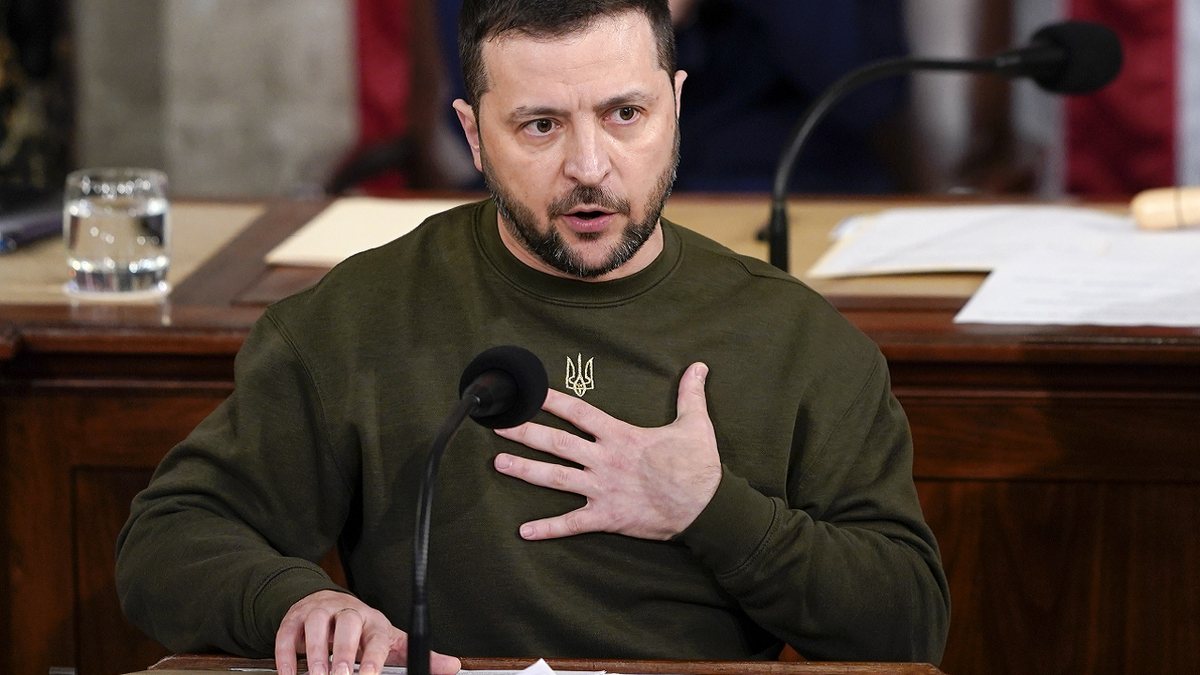
Ukrainian President Volodymyr Zelenskyy addresses a joint meeting of Congress on Capitol Hill on Dec. 21, 2022. (AP/Carolyn Kaster)
«You’ve got a $825 billion per annum defense budget to spend, [and] less than a 10th of that, take out your opponent’s tank fleet, essentially – at least, over half of it – is an amazing return on investment,» he added.
‘NOTHING MORE BACKWARDS’ THAN US FUNDING UKRAINE BORDER SECURITY BUT NOT OUR OWN, CONSERVATIVES SAY
«After 20 years of the forever war in Afghanistan before Biden’s, in my view, outrageous scuttle from that country, you’d got it down to the situation where no Americans had died for 18 months, and the whole American cost of this conflict was down to about 20 to $25 billion a year,» he said. «That’s an amazing thing, to be able to keep the Taliban out of power.»
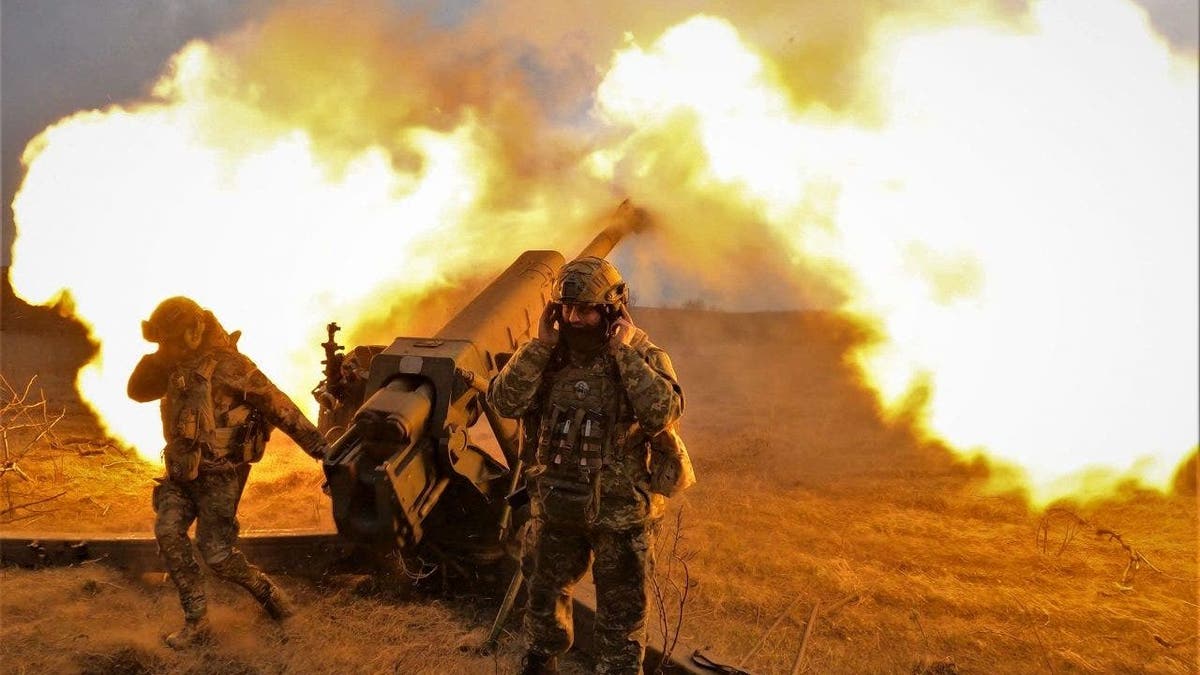
Ukrainian servicemen fire with a D-30 howitzer at Russian positions near Bakhmut, eastern Ukraine, on March 21, 2023. (Sergey Shestak/AFP via Getty Images)
However, Roberts stressed that there should remain limits to the U.S. ambitions overseas, dismissing the idea that Washington should seek Russian regime change as «not our duty, not our job, not our responsibility, and certainly not a very sensible thing.»
«The obvious reason is that it would just stoke anti-Western nationalism in Russia,» he explained. «No, they can do those things themselves, and I think the point at which they might do that is, as has happened so often in history, when Russian aggression has been shown not to succeed.»

Firefighters battle a blaze after a Russian attack on apartment buildings in Uman, south of Kiev, Ukraine, April 28, 2023. (National Police of Ukraine via AP)
Roberts lamented, though, that Russia has made strides in Ukraine’s easternmost territories, with a breakthrough on the front and potentially bigger gains to come «if the West doesn’t help Ukraine more.»
Indeed, more and more analysts and commentators have grown increasingly dismal about Ukraine’s potential successes: The BBC, Politico EU and other outlets in the last week have run articles discussing why and how Ukraine could face defeat this year. Ukrainian President Volodymyr Zelenskyy says any victory hinges on continued funding from allies to keep pace with Russia.
Roberts suggested that such doomsday prophecies may prove premature, stressing that «there’s no such thing as inevitability in history.»
CLICK HERE TO GET THE FOX NEWS APP
«So many times in history, you’ve seen one thing about to happen and then the opposite happens,» Roberts mused. «These breakthroughs the Russians are having in certain theaters… not major ones so far, but they are fighting with a shell advantage, and that’s because the United States and Europe are not providing the shells.»
«It’s certainly not inevitable that either the Ukrainians win or lose that war unless, of course, we stopped providing them with the wherewithal to continue to fight,» he warned. «It’s them that are putting up in the blood, huge amounts of it, but simply because Russia is a bigger country does not mean that it’s automatically going to win: If that was the case, you’d have won in Vietnam.»
Fox News Digital’s Brooke Singman contributed to this report.
INTERNACIONAL
Corea del Sur se sumerge en una crisis política sin precedentes en su historia democrática

Los argumentos de la oposición
El Tribunal Constitucional, campo de batalla
Una peligrosa parálisis institucional
-
POLITICA3 días ago
Victoria Villarruel se despegó de la polémica por el aumento de la dieta de los senadores: «Mi sueldo está congelado desde el año pasado»
-
INTERNACIONAL2 días ago
Rusia bombardeó Ucrania en la madrugada de Navidad: ataque masivo con misiles al sector energético
-
ECONOMIA3 días ago
Otro fallo de la Justicia para que no se aplique el Impuesto a las Ganancias al sueldo
-
POLITICA2 días ago
Marcela Pagano denunciará penalmente a los agentes de tránsito por el escándalo con los diplomáticos rusos
-
POLITICA2 días ago
Nueva amenaza de paro: ATE exige la renovación de 50.000 contratos estatales
-
POLITICA1 día ago
Otro diputado abandonó Unión por la Patria con críticas a la conducción de Cristina Kirchner: “Liderazgos del pasado”

































